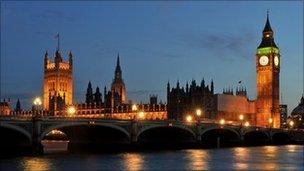Landale Online: What AV Bill battle means for Lords
- Published
Now that a deal has been struck to end the stand-off in the House of Lords over planned changes to the way we elect MPs, it is perhaps worth drawing a few early conclusions about the impact this row will have at Westminster.
1. Although this row is ostensibly about how MPs should be elected, it is really about the balance of power in the House of Lords. At the heart of many of Labour's grievances lies the fact that the voting arithmetic is against them in the Lords. The fact of the coalition means Tory and Lib Dem peers together create a formidable voting block that is hard to beat. For Labour to win, they need a comprehensive turn out of their own peers and a goodly majority of the independent crossbenchers. Labour don't like this and have been using the row to send a shot across David Cameron's bows, a warning that he should not take the House of Lords for granted, and that he should not expect to get all his business through. Equally, the government has been keen to avoid Labour setting a precedent that would allow them to do similar damage to other legislation coming down the tracks, particularly the Health Bill.

The battle has centred on the plans to cut the number of MPs
2. This row has revealed the systematic rigidity of coalition government. Normally in these confrontations, the rebel peers and the government of the day eventually hammer out a deal. This involves a little horse trading and shedding of principle in dark, red carpeted corridors late at night. But that has been difficult during this row over boundary changes. First there are two wings of the government, two sets of people with whom peers have had to negotiate. That in itself has added complications. But more fundamentally, the reason the government has been so inflexible is because the coalition agreement makes it so. If the Lib Dems are sticking on their hard-won 5 May referendum on voting changes, why should the Conservatives offer concessions on their plans to redraw constituency boundaries and cut the number of MPs?
3. This row has shown that while the House of Lords is waiting to be reformed, it is changing anyway. The Lords used to be a refined second chamber where courtesy trumped confrontation, where legislation was revised not eviscerated, where filibuster was a horse that peers backed in the 2.30 at Haydock Park. Not any more. Practices once confined to the House of Commons are now emigrating down the corridor. Conventions - unwritten rules - are being broken. The Lords now sits later than its habitual 10pm. Peers are now regularly voting against secondary legislation. Peers are using disruptive techniques introduced by former MPs and, in particular, by former whips. During debate, peers interrupt each other. They are rude to each other. Recently one peer shouted out "boring" during another's remarks. The old guard are depressed and this, more than any plans for a golden handshake, may thin out numbers in a reformed chamber.
4. This row has shown that in opposition Labour is prepared to be shameless in its use of the Lords as the Tories were in recent years. In government, it was a frequent refrain of Labour ministers to bemoan the constitutional outrage of an unelected second chamber blocking the passage of his legislation. It used to drive Tony Blair mad with frustration. Labour saw the House of Lords as a bastion of conservatism with a small and a large c, an illegitimate piece of grit in the democratic process. It was somewhere to park an unelected minister, it was somewhere to hide an unwanted MP. Now though, the worm has turned. Today it appears it is the duty of all progressive parliamentarians (that is unelected ex-MPs and party hacks) to stand in the way of a Bill that has been passed by the elected House of Commons. This, it seems, is the new politics.
5. This row will have implications for the planned reforms for the House of Lords. Ministers who have busied themselves with questions of how the Lords is composed - such as should it be 80 per cent or 100 per cent elected - are already turning their attention instead to the powers the Lords can use. Should an elected Lords still be able to delay a Bill formally through the use of the Parliament Act? Should the Lords have only a certain time period to examine a Bill, say three months? A second chamber that has been elected will by definition have more authority and therefore its powers will have to be circumscribed in any reform to avoid confrontation with the Commons. But ministers who have had their legislation duffed up like this in the Lords will be only keener to dock its tail.
6. This row has shown that the House of Lords has lost all sense of irony. At its heart, the confrontation has all been about the constitutional niceties of cutting the number of MPs by 50. Throughout the stand-off three new peers a day have been inducted into the House of Lords, an astonishingly rapid influx of new blood. Black Rod, the Lords' most senior official who has to lead the 'new bugs' in each day, looks exhausted. And guess how many new peers were appointed last autumn, the ones that he is now introducing day by day? Yes, you have guessed it, 53. Clearly, some peers are more concerned with some parts of the constitution than others.
- Published27 January 2011
- Published27 January 2011
- Published26 January 2011
- Published15 January 2011